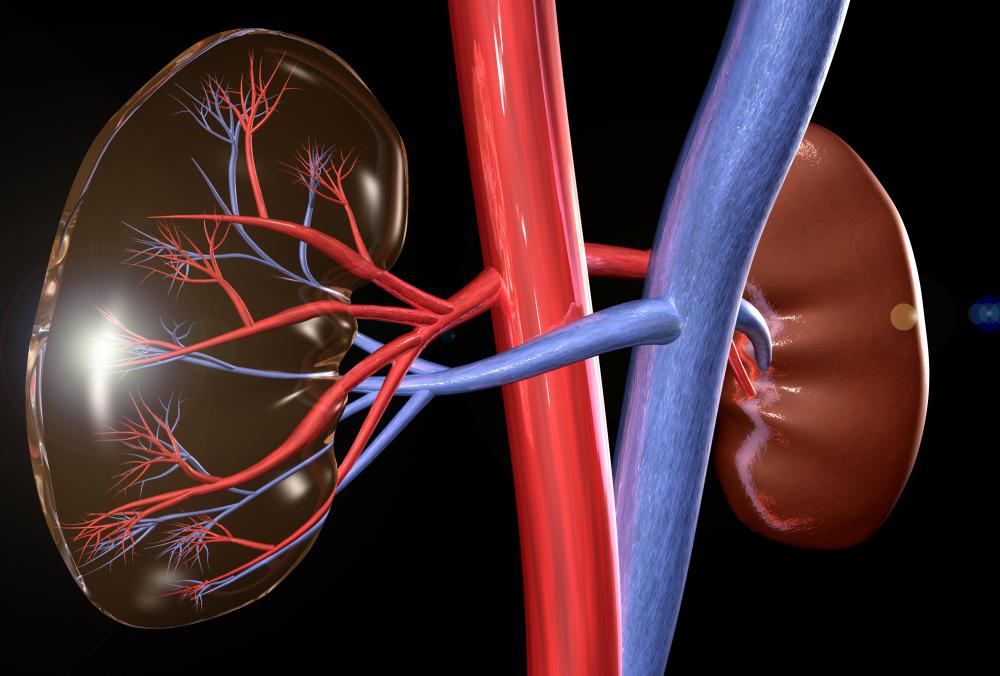At TheHealthBoard, we're committed to delivering accurate, trustworthy information. Our expert-authored content is rigorously fact-checked and sourced from credible authorities. Discover how we uphold the highest standards in providing you with reliable knowledge.
What is Human Recombinant Erythropoietin?
Human recombinant erythropoietin (HRE) is a hormone which is administered when a patient is not producing enough erythropoietin on his or her own. This hormone is typically produced and activated in the kidneys, and may be used in patients who are in kidney failure. It can also be used to treat people with anemia, and in cases where patients need to build up their hematocrit but cannot receive a blood transfusion.
In healthy people, erythropoietin (EPO) responds to low oxygen levels in the body by regulating the production of more red blood cells. If the production of red blood cells is disturbed, people can develop anemia and an assortment of complications. Human recombinant erythropoietin is used to supplement the body's production of the hormone to increase the number of red blood cells, allowing the patient to reach a healthier hematocrit reading and to avoid complications associated with a low red blood cell count.

In people on dialysis because of kidney failure, the hematocrit can fall because not enough erythropoietin is being made. In these patients, HRE compensates for the kidney issues. People with anemia, especially drug-induced anemia such as that associated with some AIDS medications, can also use this hormone. Human recombinant erythropoietin has also been used in “blood doping” in sports, with athletes taking the drug to increase red blood cells with the goal of improving performance.

Pharmaceutical companies make HRE with recombinant technology, in which genes are inserted to create a custom organism. In this particular case, mammalian cells are modified with recombination so that they will produce human erythropoietin which can be administered to patients. The same technology is used to produce a variety of other human hormones. These hormones are as effective in the body as hormones of human or animal origin, but they are easier and safer to produce.

There are side effects associated with human recombinant erythropoietin, especially in patients who use it for a long time. It can increase the risk of heavy clotting and adverse cardiovascular events, and it can also lead to iron deficiency and high blood pressure. In some young athletes, unexpected death has been linked to EPO usage, which is one of the reasons sports authorities are concerned about blood doping. Recombinant EPO is chemically slightly different from the made in the body version, and this can be used on blood tests to determine whether or not an athlete is doping.
AS FEATURED ON:
AS FEATURED ON:













Discussion Comments
@nony - I agree that for athletes, it’s probably not worth it.
However, for anemia patients who already suffer a debilitating condition, they have to weigh the erythropoietin side effects with the price they will pay if they do nothing.
The only concern I would have is to make sure that side effects are not handled with more drugs. If a patient develops high blood pressure as a result, for example, does he then take blood pressure medication? If he takes blood pressure medication, does he then take another drug to offset that drug’s side effects?
You see what I mean. I’ve known people who have taken a whole “basket” of drugs simply to compensate for one drug’s ripple of side effects.
I’ve heard of athletes taking steroids to boost their performance in sports, but this is the first time I’ve heard of “blood doping.” The notion of it just galls me.
The idea that you could infuse yourself with this recombinant protein drug so as to increase the production of your own red blood cells and increase your stamina on the field is shocking to me.
I realize that it’s probably not a widespread practice, but if you’re an athlete, I’d think you wouldn’t take any chances on negative side effects to your health by taking these drugs.
That’s just my two cents. I realize that there is a strong pressure to compete and win, but if the side effects of erythropoietin can mean a heart attack or even death, it’s simply not worth it in my opinion.
Post your comments